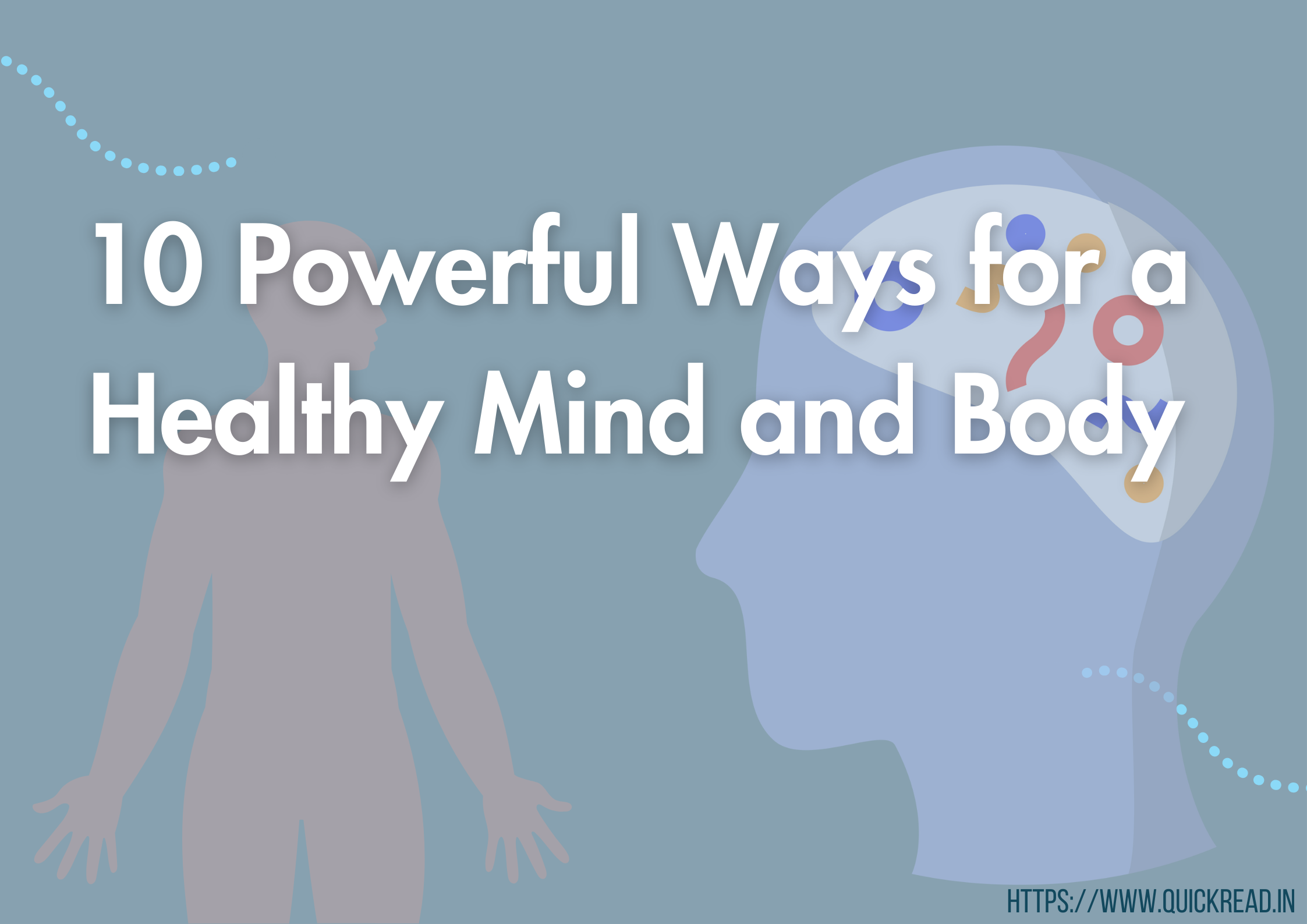Last updated on June 30th, 2023
Introduction
Maintaining a healthy mind and body is essential for overall well-being and a fulfilling life. When we prioritize our mental and physical health, we can experience increased energy, improved focus, reduced stress, and a greater sense of happiness. In this article, we will explore 10 powerful ways to cultivate a healthy mind and body, enabling you to live your best life.
1. Regular Exercise
Engaging in regular exercise is vital for both mental and physical health. Stress and anxiety are reduced by the endorphins that are released during physical activity. Aim for at least 30 minutes of moderate-intensity exercise, such as brisk walking, jogging, or cycling, most days of the week. Find activities you enjoy to make exercise a fun and sustainable habit.
2. Balanced Nutrition
A well-balanced diet provides the necessary nutrients to support brain function and maintain physical health. Include a range of fresh produce in your meals, along with whole grains, lean proteins, and healthy fats. Make sure you’re getting enough water throughout the day to stay hydrated. Avoid excessive consumption of processed foods, sugary snacks, and drinks, as they can negatively impact your overall health.
3. Quality Sleep
For both your body and mind to be healthy, you need enough sleep. body. Aim for 7-9 hours of quality sleep each night to allow your body to recharge and repair. Create a relaxing bedtime routine, limit electronic device usage before bed, and ensure your sleep environment is conducive to restful sleep. Prioritizing sleep will improve your mood, cognitive function, and overall well-being.
4. Mindfulness and Meditation
Practicing mindfulness and meditation can help calm the mind, reduce stress, and improve focus. Allocate a little period of time each day for mindfulness practises or guided meditation. Adopt a present-moment mindset, pay attention to your breathing, and examine your thoughts without passing judgement. Regular mindfulness practice can enhance self-awareness, promote emotional stability, and contribute to a healthy mental state.
5. Social Connections
Nurturing meaningful social connections is vital for mental and emotional well-being. Spend time with loved ones, engage in social activities, and cultivate supportive relationships. Surrounding yourself with positive and uplifting individuals can provide a sense of belonging and support during challenging times.
6. Stress Management
The effects of persistent stress can be felt on both mental and physical health. Develop effective stress management techniques such as deep breathing exercises, journaling, engaging in hobbies, or practicing yoga. Find what works best for you and incorporate stress-relief activities into your daily routine to maintain a healthy mind and body.
7. Mental Stimulation
For cognitive health, it’s critical to maintain mental activity and engagement.. Challenge your brain by learning new skills, solving puzzles, reading books, or engaging in intellectually stimulating activities. Continuous mental stimulation can enhance memory, sharpen focus, and promote overall brain health.
8. Time for Relaxation
Allowing yourself time for relaxation is important for recharging and rejuvenating your mind and body. Engage in activities that bring you joy and help you unwind, such as taking a bath, practicing yoga, listening to music, or spending time in nature. Find moments of relaxation throughout your day to reduce stress and promote a healthy mindset.
9. Gratitude Practice
Cultivating a gratitude practice can shift your focus to the positive aspects of life and improve your overall well-being. Take a minute each day to consider what you have to be thankful for. Write them down in a gratitude journal or share them with a loved one. Expressing gratitude can foster a positive mindset, reduce stress, and enhance happiness.
10. Seeking Professional Support
If you are facing challenges with your mental or physical health, don’t hesitate to seek professional support. Mental health professionals, nutritionists, and healthcare providers can offer guidance and support tailored to your specific needs. Remember, seeking help is a sign of strength, and professionals are there to assist you on your journey to a healthy mind and body.
FAQs about Healthy Mind and Body
Q1: How does exercise benefit mental health?
Exercise benefits mental health by releasing endorphins, reducing stress and anxiety, improving mood, and boosting self-esteem.
Q2: What are some examples of healthy fats?
Some examples of healthy fats include avocados, nuts, seeds, olive oil, and fatty fish like salmon and tuna.
Q3: How can mindfulness help with stress management?
Mindfulness helps with stress management by promoting relaxation, increasing self-awareness, and helping individuals respond to stressors in a calmer and more focused manner.
Q4: Why is social connection important for mental health?
Social connections are important for mental health as they provide a sense of belonging, support, and can help reduce feelings of loneliness and isolation.
Q5: When should I consider seeking professional support for my mental health?
You should consider seeking professional support for your mental health if you are experiencing persistent feelings of sadness, anxiety, or if your mental health is significantly impacting your daily life and functioning.
Conclusion
It takes a lifetime to learn how to take care of your body and mind. By incorporating these 10 powerful strategies into your life, you can nurture a healthy mind and body, improve your overall well-being, and live a more fulfilling life. Remember to prioritize self-care, seek support when needed, and embrace a holistic approach to your health.


